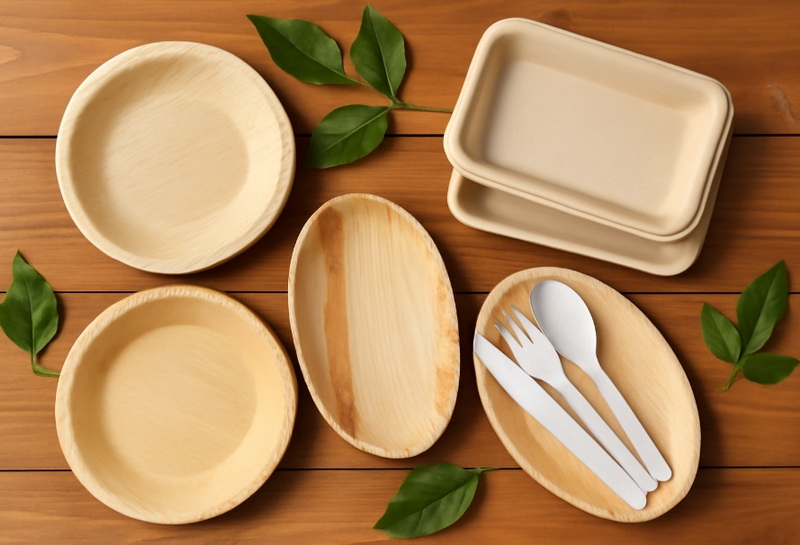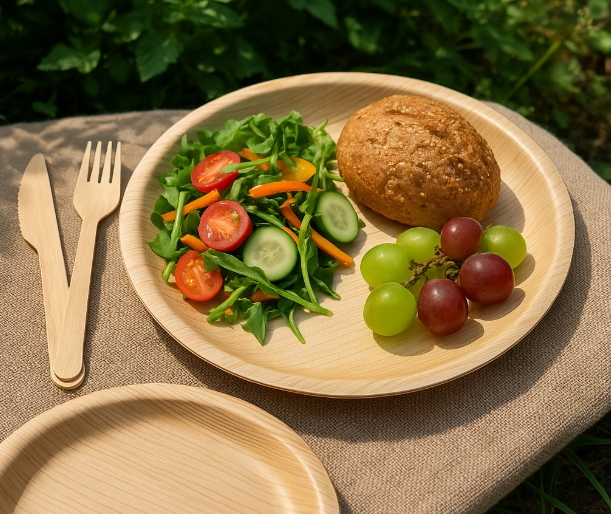
Content Menu
● Market Overview: Italy's Disposable Tableware Industry
● Key Trends: Sustainability and Customization
>> Sustainability
>> Customization
● Top Disposable Plate Manufacturers and Suppliers in Italy
● Types of Disposable Plates: Materials and Features
● How to Choose the Right Disposable Plates for Your Business
● Expanding Market Trends and Innovations
● Strengthening Sustainability Efforts
● Practical Business Tips for Buyers
● Conclusion
● Frequently Asked Questions
>> 1. What is the best material for disposable plates?
>> 2. Are biodegradable plates better than plastic plates?
>> 3. Can all disposable plates be microwaved?
>> 4. How can I ensure quality when sourcing disposable plates?
>> 5. Can I order custom-branded disposable plates in Italy?
Disposable tableware has become indispensable in the modern foodservice and hospitality industries, offering convenience, hygiene, and flexibility for businesses and consumers alike. Italy, renowned for its culinary culture and design excellence, is home to some of Europe's most innovative and reliable disposable plate manufacturers and suppliers. This article explores the leading players in the Italian market, the latest trends in sustainable materials, and practical tips for choosing the right disposable plates for your business needs.

Market Overview: Italy's Disposable Tableware Industry
Italy's disposable tableware market is robust and rapidly evolving, driven by changing consumer lifestyles, urbanization, and a strong shift toward sustainability. Disposable plates, in particular, hold a significant market share—about 29% in 2024—due to their widespread use in both residential and commercial settings. The rise of fast food, food delivery apps, and on-the-go consumption, especially among millennials, has fueled demand for high-quality, visually appealing, and eco-friendly tableware.
>“The Italian disposable tableware market features several prominent players, including DOpla SPA, ILIP SRL, Huhtamaki SPA, IMB SPA, and Fabbrica Pinze Schio SRL, who are driving innovation in sustainable product development.”
Environmental regulations, such as the EU's directive on single-use plastics, have accelerated the transition toward biodegradable and compostable plate options, prompting manufacturers to invest in new materials and greener processes.
Key Trends: Sustainability and Customization
Sustainability
- Biodegradable and Compostable Plates: Italian manufacturers are pioneering the use of materials like bagasse (sugarcane fiber), bamboo, and wood pulp to create plates that are both functional and environmentally friendly.
- Plastic-Free Alternatives: Companies such as EcoTensil and BIOPAP® have introduced innovative, plastic-free, and PFAS-free plates that are fully compostable and suitable for professional catering.
- Retailer Initiatives: Major retailers like SPAR Italy have launched green product lines featuring plates made from vegetable fibers.
Customization
- Digital Printing: Custom-designed plates with digital printing capabilities are in high demand, allowing brands and event organizers to enhance their image and marketing efforts.
- OEM/ODM Services: Many Italian and international suppliers offer OEM (Original Equipment Manufacturer) and ODM (Original Design Manufacturer) services, enabling private labeling and tailored solutions for global clients.
Top Disposable Plate Manufacturers and Suppliers in Italy
Below is a curated list of leading disposable plate manufacturers and suppliers in Italy, renowned for their innovation, quality, and commitment to sustainability:
| Company Name | Specialty/Notes | Location |
| DOpla SPA | Wide range of disposable tableware, focus on R&D | Italy-wide |
| ILIP SRL | Designer plates, customized printing | Italy-wide |
| Huhtamaki SPA | Sustainable and flexible packaging solutions | Italy-wide |
| IMB SPA | Biodegradable and compostable tableware | Italy-wide |
| Fabbrica Pinze Schio SRL | EcoZema brand, compostable products | Veneto |
| ISAP Packaging S.p.A. | Part of a European group, exports globally | Italy-wide |
| Flo S.p.A. | Plastic and paper plates, vending solutions | Fontanellato, PR |
| Usobio (C.P.B.) | Compostable, bioplastic plates | Trento/Bergamo |
| BIOPAP® | PFAS-free, pulp-based, compostable plates | Italy-wide |
| Gold Plast Srl | Party line, retail and wholesale plates | Napoli |
| Forniture E Servizi Di Catering SRL | Paper & plastic plates for catering, pizzerias | Oria, Brindisi |
>“The Italian disposable tableware market exhibits a highly fragmented structure, with leading companies accounting for only 15-20% of manufacturing capacity, indicating significant opportunities for market consolidation.”
Tip: For a complete directory of suppliers and manufacturers, B2B platforms like Europages and SJN list over 200 Italian companies specializing in disposable tableware.
Types of Disposable Plates: Materials and Features
Italian disposable plate manufacturers and suppliers offer a diverse range of products to suit every need. Here's a breakdown of the most common materials and their features:
| Material | Key Features | Eco-Friendliness | Typical Use Cases |
| Paper/Cardboard | Lightweight, compostable, customizable, cost-effective | High (if uncoated or PLA-lined) | Parties, events, catering |
| Bamboo | Durable, elegant, naturally biodegradable | Very high | Upscale events, eco-conscious catering |
| Bagasse | Made from sugarcane waste, sturdy, compostable | Very high | Foodservice, hot/cold foods |
| Plastic | Strong, versatile, suitable for hot/oily foods | Low (unless recycled) | Fast food, takeaways, large gatherings |
| Foam (EPS) | Insulating, lightweight, low cost | Low (being phased out) | Budget events, limited use |
| Bioplastic (PLA/CPLA) | Compostable, heat-resistant, clear options | High | Cafes, eco-friendly venues |
>“Paper plates are commonly used for casual gatherings... Bamboo disposable plates are not only durable but also naturally elegant, often used at events like weddings or upscale outdoor dinners.”
Certifications to Look For: CE, EU, FDA, ISO, LFGB, SGS for food safety and environmental compliance.

How to Choose the Right Disposable Plates for Your Business
Selecting the optimal disposable plates depends on several factors:
- Intended Use: Consider whether plates are for catering, restaurants, events, or takeaways.
- Material: Choose eco-friendly materials (bagasse, bamboo, paper) for sustainability, or plastic for heavy-duty needs.
- Size and Shape: Match plate size to menu offerings (snacks, main courses, desserts).
- Customization: Opt for suppliers offering logo printing or custom colors for branding.
- Regulatory Compliance: Ensure products meet local and EU food safety and environmental standards.
- Bulk Pricing and MOQ: Evaluate suppliers based on minimum order quantities and bulk discounts.
- Lead Time: Confirm delivery timelines, especially for large or recurring orders.
- OEM/ODM Capability: For brand owners and wholesalers, partnering with OEM/ODM manufacturers allows for private labeling and exclusive designs.
>“Choosing eco-friendly plates enhances the environmental responsibility image of your business and that of your clients—critical in today's market.”
Expanding Market Trends and Innovations
The disposable plate industry in Italy is witnessing several exciting innovations beyond sustainability. Manufacturers are increasingly integrating smart technology into their products, such as QR codes printed on plates that link to recycling instructions or brand stories, enhancing consumer engagement and environmental awareness.
Italian companies are also exploring the use of agricultural by-products beyond bagasse, such as wheat straw and palm leaves, to diversify their eco-friendly product lines. This diversification not only reduces waste but also provides unique textures and aesthetics that appeal to niche markets.
Strengthening Sustainability Efforts
Sustainability in the disposable plate sector goes beyond materials. Italian manufacturers are adopting circular economy principles, focusing on reducing production waste, improving energy efficiency, and using renewable energy sources in their factories. Some companies have implemented take-back programs where used plates are collected and composted or recycled, closing the loop in product lifecycle.
Moreover, collaborations between manufacturers and environmental organizations are common, aiming to raise awareness and promote responsible consumption among consumers and businesses alike.
Practical Business Tips for Buyers
When sourcing disposable plates from Italy, buyers should consider the following practical tips:
- Supplier Transparency: Choose suppliers who provide clear information about material sourcing, production processes, and certifications.
- Sample Testing: Always request samples to test durability, heat resistance, and appearance before placing large orders.
- Logistics and Shipping: Factor in shipping times and costs, especially for international buyers, to ensure timely delivery.
- Regulatory Updates: Stay informed about changing regulations in your target markets to ensure compliance and avoid disruptions.
- Building Relationships: Establish long-term partnerships with manufacturers to benefit from better pricing, customization options, and priority service.
These strategies help businesses optimize their procurement process and align with sustainability goals.
Conclusion
Italy's disposable plate market is dynamic, innovative, and increasingly sustainable, led by top manufacturers and suppliers like DOpla SPA, ILIP SRL, Huhtamaki, and BIOPAP®. With a wide range of eco-friendly materials, customizable options, and a focus on regulatory compliance, Italian suppliers are well-equipped to serve global brands, wholesalers, and production partners. Whether you need compostable plates for catering or custom-printed designs for retail, Italy's disposable plate industry offers quality, variety, and a strong commitment to the environment.

Frequently Asked Questions
1. What is the best material for disposable plates?
The best material depends on your needs: bagasse, bamboo, and palm leaf plates are the most eco-friendly, while plastic is preferred for heavy-duty or oily foods.
2. Are biodegradable plates better than plastic plates?
Yes. Biodegradable plates naturally decompose and have a much lower environmental impact than traditional plastic plates, which can persist for centuries.
3. Can all disposable plates be microwaved?
No. Only certain materials like bagasse, bamboo, and uncoated paper are microwave-safe. Avoid microwaving foam and most plastic plates.
4. How can I ensure quality when sourcing disposable plates?
Work with reputable suppliers, check for food safety and eco certifications, and request samples before placing bulk orders.
5. Can I order custom-branded disposable plates in Italy?
Yes. Many Italian manufacturers and suppliers offer OEM/ODM services, allowing you to customize plates with your logo, colors, and designs for private labeling.

















